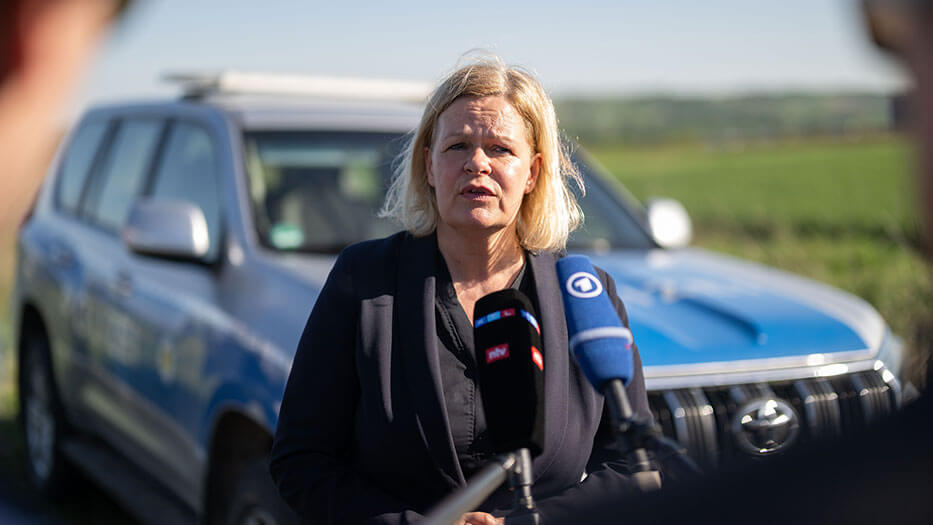German Interior Minister Nancy Faeser on Monday paid a visit to Bulgaria to see how reinforcements on the border between Turkey and the EU member state were working in practice, Bulgarian news outlets reported.
After meeting with her Bulgarian counterpart, acting Interior Minister Kalin Stoyanov, in the southern Bulgarian city of Plovdiv, the two ministers travelled to the Kapitan Andreevo border crossing, situated between Bulgaria and Turkey.
“Open internal borders can only exist with strong protection of the EU’s external borders. We can achieve this protection of the external borders and orderly asylum procedures with the new regulations,” Faeser said during the visit, which came shortly after the adoption of the European Parliament’s new EU Asylum and Migration Pact.
Following years of debate, European Union lawmakers last week passed the landmark reform of the bloc’s asylum system to reduce irregular migration. The new rules are set to take effect in 2026.
Faeser said the pact’s adoption is extremely important for the protection of the EU’s external borders, adding that the pact prevents division in Europe and the EU and sets common standards for migration.
The new EU Asylum and Migration Pact aims to manage the impact of migration on the bloc by accelerating the rejection of invalid applications and by sharing the burden of processing asylum requests more evenly among member states.
Stoyanov and Faeser later inspected the work of border control authorities at Kapitan Andreevo and the Trilateral Centre for Police and Customs Cooperation between Bulgaria, Turkey and Greece.
In 2017, Bulgaria erected a 234-kilometer metal fence along much of its border with Turkey, funded by the EU. Barbed wire tops the fence, and at points there are thermal imaging cameras to detect anyone attempting to cross.
According to a statement from Stoyanov last month, there has been a significant decrease in attempts to illegally cross from Turkey into Bulgaria.
Bulgarian authorities have thwarted 5,200 illegal attempts to cross the Bulgarian-Turkish border since the start of the year. This figure contrasts sharply with the 15,600 attempts recorded during the same period of 2023. Additionally, the number of migrants detained in Bulgaria has fallen to 260 this year from 1,260 last year.
The 259-kilometer border between Bulgaria and Turkey is often crossed by migrants and refugees from crisis-affected regions, seeking to enter the European Union without going through official border checks. Most of these migrants seek to pass through Bulgaria, the EU’s poorest member state, en route to Central and Western Europe.
The Kapitan Andreevo border crossing is one of the busiest in the European Union, notorious as an entry point for drugs into the EU, and has long been reported to be run by organized crime. It is part of a wider Bulgarian problem of corruption at the border, which had prevented Bulgaria’s accession to the Schengen zone, finally accomplished on March 31.
Kapitan Andreevo’s counterpart on the Turkish border is Kapıkule.
Meanwhile, when asked by a German journalist about cases of violence and theft against refugees, Stoyanov said that since new leadership took office at the Bulgarian Interior Ministry in June 2023, the number of such cases has dropped to single digits. They are investigated by special commissions, and every perpetrator will bear responsibility for their actions, the minister said.
Turkey has been a key transit country for refugees and migrants aiming to reach Europe, exacerbated by the Syrian civil war, which started in 2011.
Greece and Bulgaria are frequently accused of illegally pushing back asylum seekers who have reached their territories, thereby denying them their right to asylum.

